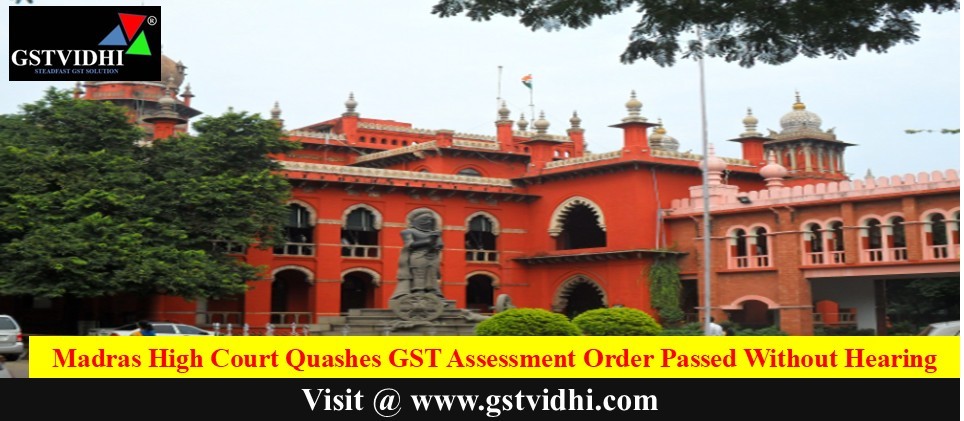
Madras High Court Quashes GST Assessment Order Passed Without
Hearing
Summary of
the Case
The Madras High Court
held that uploading notices only on the GST portal without granting personal
hearing violates the principles of natural justice. The assessment order
passed under Section 73 of the CGST/TNGST Act, 2017, was quashed and the matter
remanded for fresh adjudication. The Court emphasized that actual service
and effective hearing are vital and directed that the petitioner pay 25%
of the disputed tax as a precondition.
· Tvl
G P Associates v. Deputy State Tax Officer-1
·
Court:
High Court of Judicature at Madras
·
Order No.:
W.P.No.24989 of 2025 & W.M.P.Nos.28160 & 28161 of 2025
Date of Judgment: 10.07.2025
Brief Facts
of the Case
- The petitioner received an assessment
order dated 28.08.2024 under Section 73 of the CGST/TNGST Act for the
FY 2019–20.
- Notices and the summary order (in DRC-07)
were only uploaded under the “View Additional Notices and
Orders” tab on the GST portal.
- The petitioner claimed no
knowledge of these uploads and therefore failed to respond or file
objections.
- No personal hearing
was granted before finalizing the assessment.
- The petitioner approached the High
Court under Article 226 of the Constitution challenging the assessment
order and seeking relief.
Submissions
by the Petitioner
Counsel: Ms. Aparna
Nandakumar
- Argued that:
- All communications were made only
through portal uploads, and no effective notice was served.
- No opportunity of personal hearing
was provided.
- Offered to pay 25% of the disputed
tax amount as a condition for re-adjudication.
- Requested the Court to set aside
the assessment order and remand the matter for fresh consideration.
Submissions
by the Respondent
Counsel: Mrs. K.
Vasanthamala, Government Advocate
- Admitted:
- The notices were only uploaded on
the portal.
- No personal hearing
was granted.
- Agreed to remand the matter back, subject
to payment of 25% of the disputed tax.
Court’s
Reasoning and Observations
1. Portal
Upload ≠ Effective Service:
o While
service through GST portal is statutorily valid, mere technical compliance
is not enough.
o When
there is no response from the taxpayer, the authority should attempt other
valid modes under Section 169(1) of the Act—such as Registered Post
(RPAD) or email.
2. Natural
Justice Must Prevail:
o An
ex parte assessment order passed without granting personal hearing,
especially when taxpayer is unaware of notices, is unsustainable.
o The
Court strongly emphasized:
“Passing ex parte orders
just to fulfill empty formalities undermines both fairness and efficiency.”
3. Avoiding
Multiplicity of Litigation:
o The
judgment warns officers that improper service of notice results in waste of
judicial and departmental resources, and increased burden on appellate
authorities.
Final
Judgment
The High Court issued the
following directions:
1. Impugned
order dated 28.08.2024 is set aside.
2. The
matter is remanded to the respondent subject to payment of 25% of the
disputed tax within four weeks.
3. The
setting aside of the order will take effect only after such payment.
4. The
petitioner shall file a reply/objection within three weeks from
the date of payment.
5. The
respondent shall:
o Issue
a 14-day clear notice for personal hearing.
o Pass
fresh speaking orders after hearing the petitioner on merits
and in accordance with law.
6. No
costs were awarded; miscellaneous petitions also closed.
Conclusion
This judgment reinforces
the principle that compliance with procedural fairness under GST law is not
a mere formality. Authorities must take active steps to ensure service
is effective, especially when taxpayers do not respond. The Court’s
insistence on pre-deposit balances equity with accountability, and sends a
strong message that natural justice is integral to fair tax administration.
Disclaimer: All the Information is based on the notification, circular advisory and order issued by the Govt. authority and judgement delivered by the court or the authority information is strictly for educational purposes and on the basis of our best understanding of laws & not binding on anyone.
Find the Attachment (Press on Click Here )
Click here